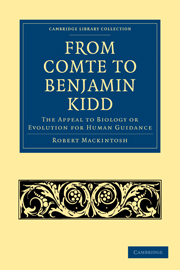Book contents
- Frontmatter
- PREFACE
- Contents
- CHAPTER I INTRODUCTORY
- PART I COMTISM, WITH SOME SCATTERED PARALLELS
- PART II SIMPLE EVOLUTIONISM—SPENCER, STEPHEN
- CHAPTER VII DARWINIAN AND SPENCERIAN CONCEPTIONS OF EVOLUTION—DARWIN
- CHAPTER VIII DARWINIAN AND SPENCERIAN CONCEPTIONS OF EVOLUTION—SPENCER
- CHAPTER IX MR. SPENCER'S THREE DOCTRINES OF HUMAN WELFARE
- CHAPTER X MR. LESLIE STEPHEN'S “SCIENCE OF ETHICS”
- PART III DARWINISM, OR STRUGGLE FOR EXISTENCE
- PART IV HYPER-DARWINISM—WEISMANN, KIDD
- Index
CHAPTER X - MR. LESLIE STEPHEN'S “SCIENCE OF ETHICS”
Published online by Cambridge University Press: 29 August 2010
- Frontmatter
- PREFACE
- Contents
- CHAPTER I INTRODUCTORY
- PART I COMTISM, WITH SOME SCATTERED PARALLELS
- PART II SIMPLE EVOLUTIONISM—SPENCER, STEPHEN
- CHAPTER VII DARWINIAN AND SPENCERIAN CONCEPTIONS OF EVOLUTION—DARWIN
- CHAPTER VIII DARWINIAN AND SPENCERIAN CONCEPTIONS OF EVOLUTION—SPENCER
- CHAPTER IX MR. SPENCER'S THREE DOCTRINES OF HUMAN WELFARE
- CHAPTER X MR. LESLIE STEPHEN'S “SCIENCE OF ETHICS”
- PART III DARWINISM, OR STRUGGLE FOR EXISTENCE
- PART IV HYPER-DARWINISM—WEISMANN, KIDD
- Index
Summary
Mr. Stephen makes his intellectual history very plain in the preface to the Science of Ethics. He started in the life of thought as a utilitarian, under the strong influence of J. S. Mill; and he never came to regard the utilitarian position as discredited. But, in course of time, impressed partly by Darwin's theory, partly by Spencer's writings, he began to crave a restatement of ethics. This was in no sense a concession to intuitionalism. Spencer's “reconciliation of intuitionalism with empiricism” is indeed accepted by Mr. Stephen, as appears from his other writings; but, unless one has read the Science of Ethics very carelessly, no reference is made to the doctrine in Stephen's moral system, and it seems to go for little with him. Indeed, his first view of evolutionism hailed it as a new stick for beating the intuitionalist dog withal—a new reason for rejecting the conception of ready-made and all authoritative ideas in the human mind. And when he conceived the possibility and desirableness of a new system of morals, he had not in view a worthier ethic than utilitarianism, but rather one more fully in harmony with new scientific truths. Science, not philosophy, demanded the change. Evolutionism must be given effect to. If the change results in a more adequate statement of moral ideas, that is, for Mr. Stephen, a secondary matter. The great thing with him, as on a broader canvas with Mr. Spencer, is to unify thought.
- Type
- Chapter
- Information
- From Comte to Benjamin KiddThe Appeal to Biology or Evolution for Human Guidance, pp. 95 - 109Publisher: Cambridge University PressPrint publication year: 2009First published in: 1899

